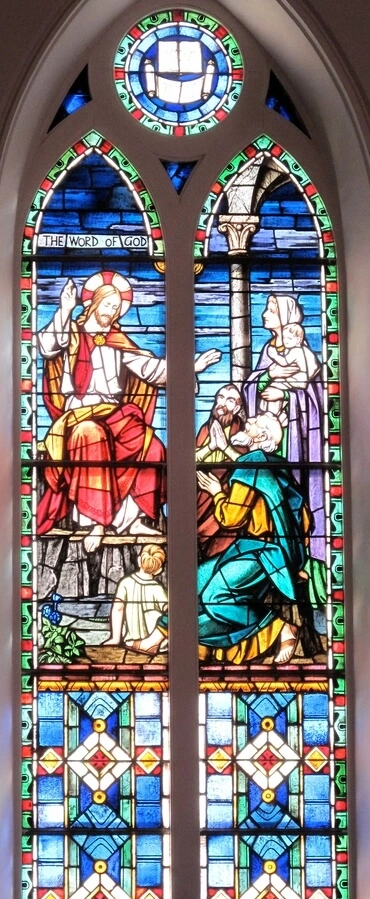2
The same was in the beginning with God.
By Brian David

This verse reinforces points in the first verse: that the divine truth was not created by or created after the divine love which it expresses. The two are one: Love has to express itself as truth to have form; truth has to express love to have substance. Love without truth is not really love at all; it’s just a feeling and a potential. Truth without love is not really truth; it’s just a concept with no goal, no use, no purpose.
"God" here represents the Lord’s desire for good; this verse then reinforces that perfect truth and perfect good were together from the beginning.
It’s also worth noting that along with the ultimate "beginning," there are also "beginnings" for each of us, marking the moments when we choose to turn away from evil and open ourselves to the Lord. This verse, then, reassures us that when we make such a beginning, the Lord’s love and the Lord’s truth will be there for us. And it also tells us that if we want to make a real beginning, we need to find that truth and cling to it as the best way to receive the Lord’s love.
46. The Holy Spirit Is the Divinity Emanating from the Lord, and It Is the Lord Himself
Jesus said in Matthew:
All authority has been given to Me in heaven and on earth. Go therefore and make disciples of all the nations, baptizing them in the name of the Father and of the Son and of the Holy Spirit, teaching them to observe all things that I have commanded you; and lo, I am with you always, even to the completion of the age. (Matthew 28:18-20)
We have already shown that the Divine called the Father and the Divine called the Son are united in the Lord. Now, therefore, we must show that the Holy Spirit is identical with the Lord.
[2] The Lord told His disciples to baptize in the name of the Father, Son and Holy Spirit, because there is a trine or trinity in the Lord. For there is the Divinity called the Father, the Divine humanity called the Son, and the emanating Divinity called the Holy Spirit. The Divine called the Father and the Divinity called the Son are the originating Divinity, and the emanating Divinity called the Holy Spirit is the instrumental Divinity.
That no other Divinity emanates from the Lord than the Divinity which is Himself is something that will be seen in short works to come regarding Divine providence and Divine omnipotence, omnipresence, and omniscience, for it entails a deeper investigation.
[3] That there is a trine in the Lord may be illustrated by comparison with an angel. An angel has a soul and a body, and also something emanating. That which emanates from him is himself beyond his person. (I have been given to know much about this emanation, but this is not the place to present it.)
[4] Everyone who looks to God is, after death, first taught by angels that the Holy Spirit is not someone different from the Lord, and that to emit and emanate means nothing else than to enlighten and teach by His presence, which depends on a person’s reception of the Lord. Most people after death accordingly put away the concept they had formed in the world regarding the Holy Spirit, and accept instead the view that the Holy Spirit is the Lord’s presence in a person by means of angels and spirits, by which and in accordance with which a person is enlightened and taught.
[5] Furthermore, the Word customarily refers to the Divine by two names, and sometimes three, which nevertheless constitute one Divine. So we find, for example, Jehovah and God, Jehovah and the Holy One of Israel, Jehovah and the Mighty One of Jacob, and God and the Lamb. Because these are one and the same, we are also told in other places that Jehovah alone is God, that Jehovah alone is holy, and that He is the Holy One of Israel, and no other besides Him. We find also that instead of God He is sometimes called a Lamb, and instead of a Lamb, sometimes God — the first in the Prophets, the second in the book of Revelation.
[6] That the Lord alone is meant by the Father, Son and Holy Spirit in Matthew 28:19 is apparent from the verses that precede and follow there. In the preceding verse the Lord says, “All authority has been given to Me in heaven and on earth.” And in the following verse He says, “Lo, I am with you always, even to the completion of the age, ” thus speaking of Himself alone. He spoke, therefore, as He did in order that His disciples might know that He had in Him a trinity.
[7] For it to be known that the Holy Spirit is not some other Divinity than the Lord Himself, we must show what is meant in the Word by spirit. By spirit is meant the following:
1. A person’s life in general.
2. Because a person’s life varies in accordance with his state, therefore by spirit is meant the life’s varying affection in a person.
3. It is also the life of a regenerate person, the life called spiritual life.
4. Whenever the term spirit is applied to the Lord, however, it means His Divine life, thus the Lord Himself.
5. In particular it means the life of His wisdom, which is called Divine truth.
6. Jehovah Himself, that is, the Lord, spoke the Word through the prophets.
Published by the General Church of the New Jerusalem, 1100 Cathedral Road, Bryn Athyn, Pennsylvania 19009, U.S.A. A translation of Doctrina Novae Hierosolymae de Domino, by Emanuel Swedenborg, 1688-1772. Translated from the Original Latin by N. Bruce Rogers. ISBN 9780945003687, Library of Congress Control Number: 2013954074.